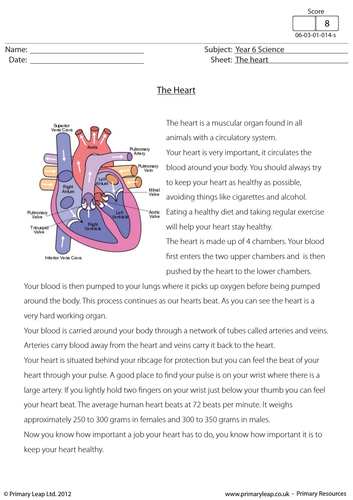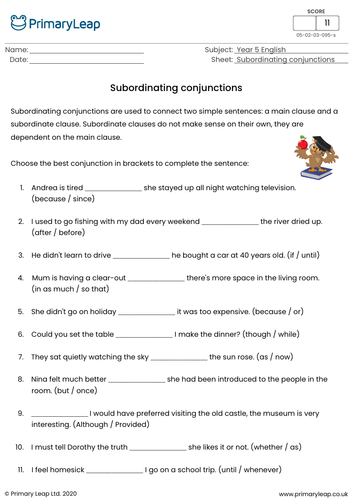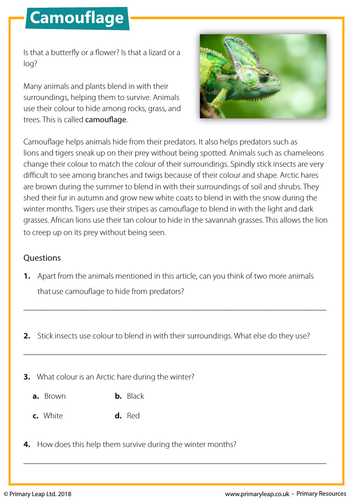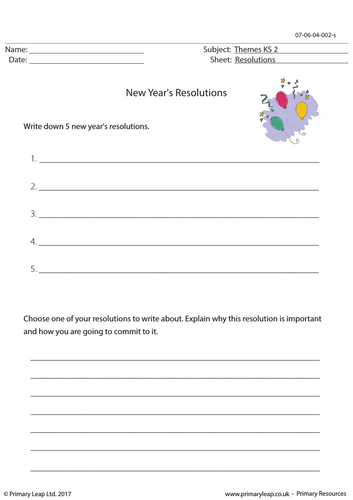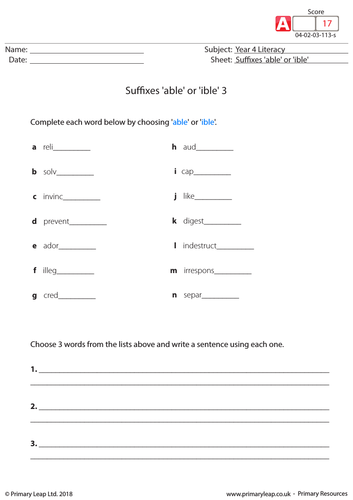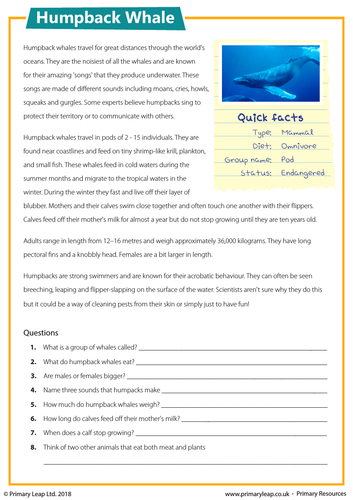560Uploads
454k+Views
210k+Downloads
Literacy for early years

KS2 Reading Comprehension - Hummingbirds
This KS2 reading comprehension includes an information sheet about hummingbirds. Students read through the article and answer the accompanying study questions.
Find more resources at Primary Leap

KS2 English Worksheet: Suffix - 'tion' words
A suffix is a phonetic unit that is placed after a root word. This English resource focuses on the suffix: tion. Students complete the sentences by writing the correct word.
This worksheet was created by Lauren Savage @ Primary Leap

KS2 Science worksheet - Photosynthesis
Year 3 Science - Unit 3B: Helping plants grow well. This worksheet describes the process of photosynthesis. Students read the text and then answer the study questions.
This worksheet was created by Lauren Savage @ Primary Leap

KS2 Reading Comprehension - The Human Heart
This worksheet was created by primaryleap.co.uk
A KS2 reading comprehension about the heart with questions to follow.

Reading Comprehension - The Selfish Giant
Students are asked to read through a part taken from the book: The Selfish Giant by Oscar Wilde. There are comprehension, vocabulary, and discussion topics for students to complete. There is also a word search included.
Find more resources at Primary Leap

Reading Comprehension - Autumn is the Time of Year
This poem is all about Autumn. Students are asked to read through the poem and answer the accompanying questions.

KS2 English - Subordinating conjunctions
Subordinating conjunctions are used to connect two simple sentences: a main clause and a subordinate clause. Subordinate clauses do not make sense on their own, they are dependent on the main clause. This English activity asks students to choose the best conjunction in brackets to complete the sentences.
Resource created by Lauren Savage

KS2 English - Coordinating conjunctions
Coordinating conjunctions are used to connect sentences, words and phrases. They act as a kind of glue, linking the text together to help the sentences flow smoothly. This English resource asks students to choose the best conjunction in brackets to complete the sentences.
Worksheet created by Primary Leap

KS2 Reading Comprehension - Camouflage
This KS2 reading comprehension includes an interesting article about camouflage with questions to answer.
This worksheet was created by Primary Leap

KS2 English Worksheet - Using 'Did' and 'Done'
This worksheet was created by Lauren Savage @ Primary Leap
Children complete the sentences by choosing ‘did’ or ‘done’.

Cloze Activity - Facts About Forces
This worksheet was created by Primary Leap
How do we measure forces? Who was one of the first scientists to study gravity and force? This science resource asks students to read the facts about forces and motion and fill in the missing words. There is a word bank to help them.

New Year's Resolutions Worksheet
Students write down five new year’s resolutions. They then choose one of their resolutions to write about and explain why it is important to them and how they’re going to commit to it.
This worksheet was created by primaryleap.co.uk

Making Inferences from Pictures 1
Inferences are what we figure out based on an experience. Helping students understand when information is implied, or not directly stated, will improve their skill in drawing conclusions and making inferences which is an essential skill in reading comprehension. This English resource shows 2 happy children using a laptop. Students are asked to look at the picture and then answer the questions, giving their reasons for each answer.
Find more resources at Primary Leap

English Worksheet: Adverbs with Suffix - ly
This year 3 English resource is designed to encourage children to use adverbs with suffix - ly. Students write their own sentences using the words provided.
Additional worksheets, lesson plans, and interactive activities are available on Primary Leap.

KS2 English Resource - Suffixes 'able' or 'ible'
A KS2 literacy worksheet focusing on the suffixes ‘able’ and ‘ible’. Students complete each word by choosing ‘able’ or ‘ible’.
This worksheet was created by Primary Leap

Verb prefixes - dis and mis
A prefix is a group of letters added before a word to alter its meaning. The prefix ‘dis’ is generally used to make a word negative. The prefix ‘mis’ means badly, wrongly or incorrectly. This English resource asks students to choose the correct word to complete the sentence.
This worksheet was created by Lauren Savage

KS2 Reading Comprehension - Charles Dickens
Charles Dickens was born on 7th February in 1812. Celebrate his birthday with this reading comprehension including some interesting facts and information about the famous writer. Students read through the text and answer the questions. This resource was created by Lauren Savage @ Primary Leap

KS2 Reading Comprehension - Humpback Whale
This year 5 English worksheet includes a short passage with facts about humpback whales and questions to follow.
This worksheet was created by Primary Leap

Making Inferences from Pictures 3
Inferences are what we figure out based on an experience. Helping students understand when information is implied, or not directly stated, will improve their skill in drawing conclusions and making inferences which is an essential skill in reading comprehension. Students are asked to look at the picture and then answer the questions.
Find more resources at Primary Leap

KS2 English worksheet: Phonics - 'ire' and 'ear' words
This English worksheet asks students to complete the sentences by choosing the correct word from the word bank. This resource focuses on the phonics ‘ire’ and ‘ear’.
This worksheet was created by Lauren Savage @ Primary Leap




